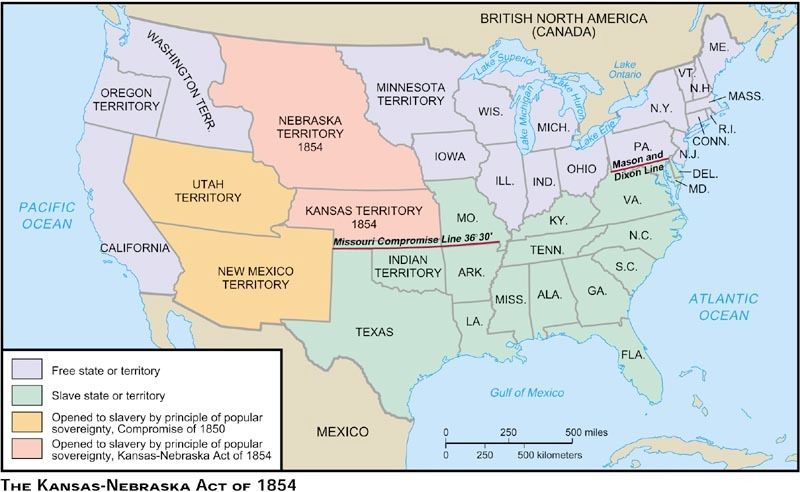
Posted on 03/01/2016 5:06:06 AM PST by Homer_J_Simpson

I’m happy to see that Homer has adopted the publication. :-)
Which is a very good thing, because he is much more reliable and steady than I am. ;-)
The Irish Famine had resulted in large scale immigration to the U.S. and considerable to Canada. Indeed, after the Civil War American Fenians would attempt an "invasion" of Canada to overthrow British rule.
Ah yes, the good ol’ days when politics were civil . . .
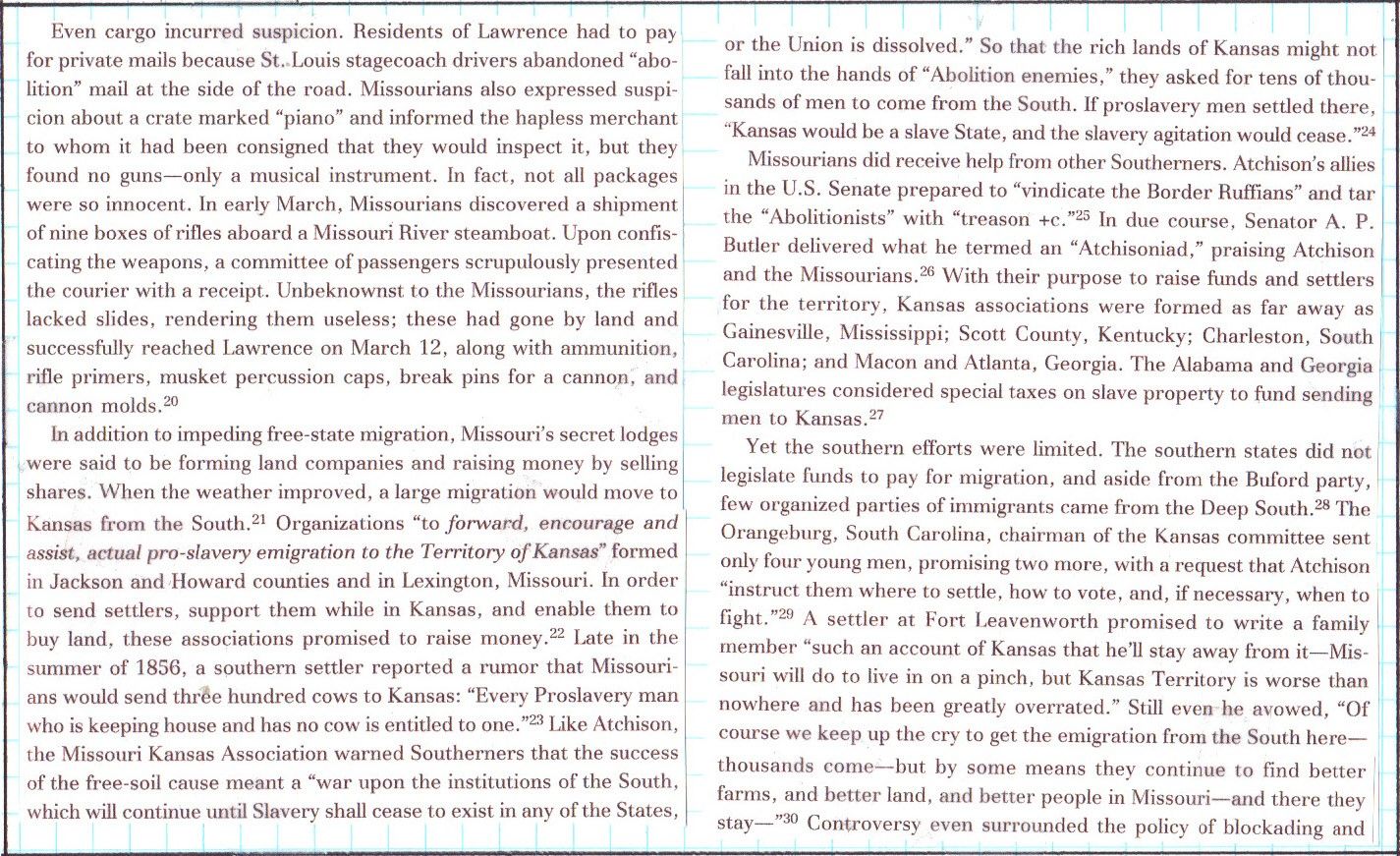
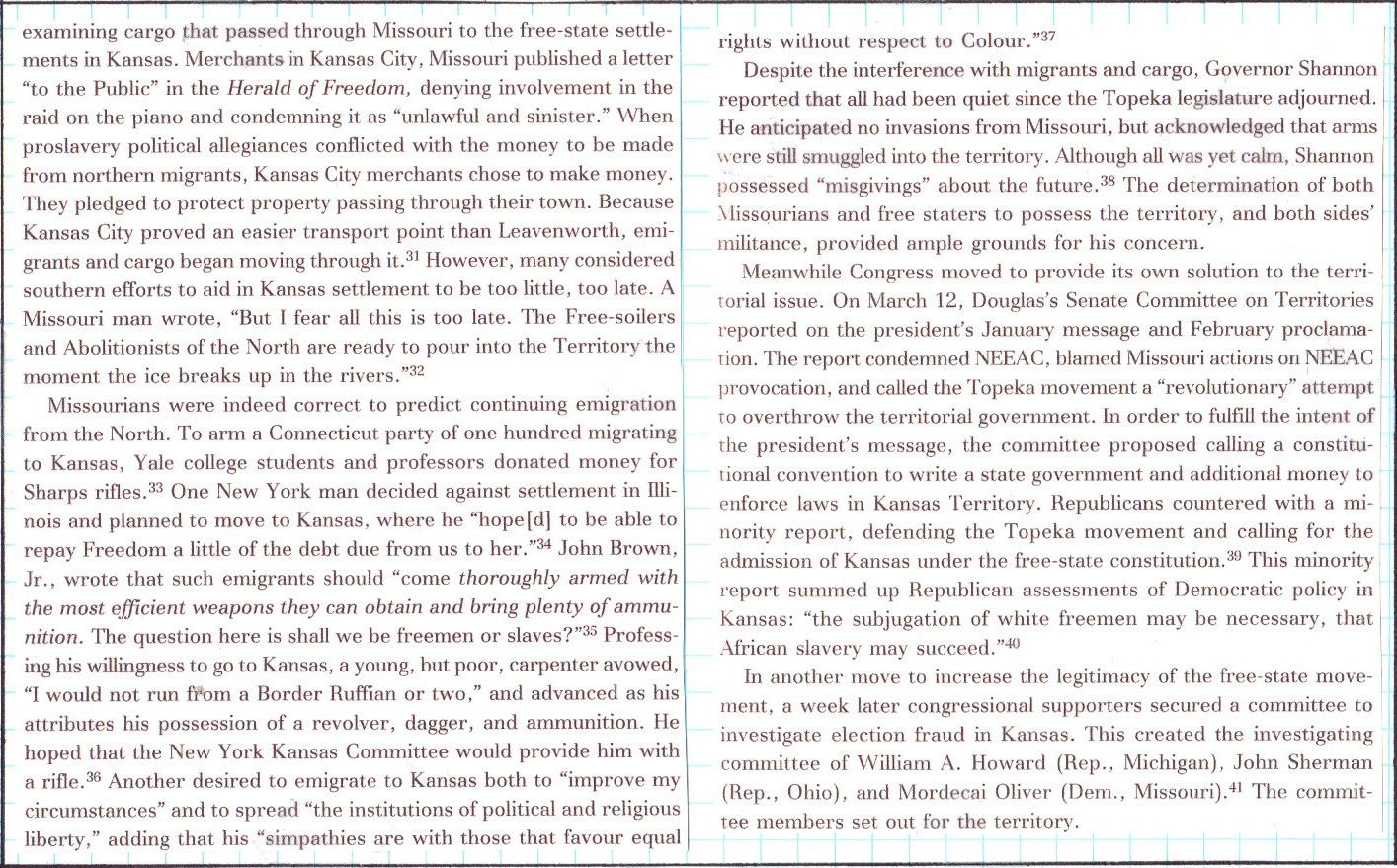
Nicole Etcheson, "Bleeding Kansas: Contested Liberty in the Civil War Era"
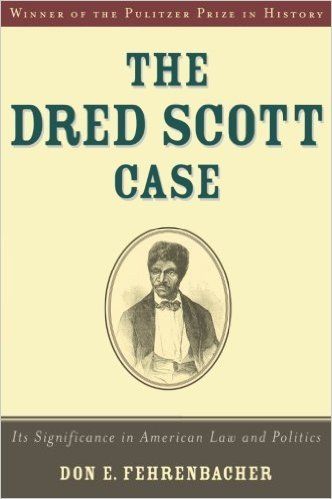
Continued from February 1856 (reply #11, first excerpt)
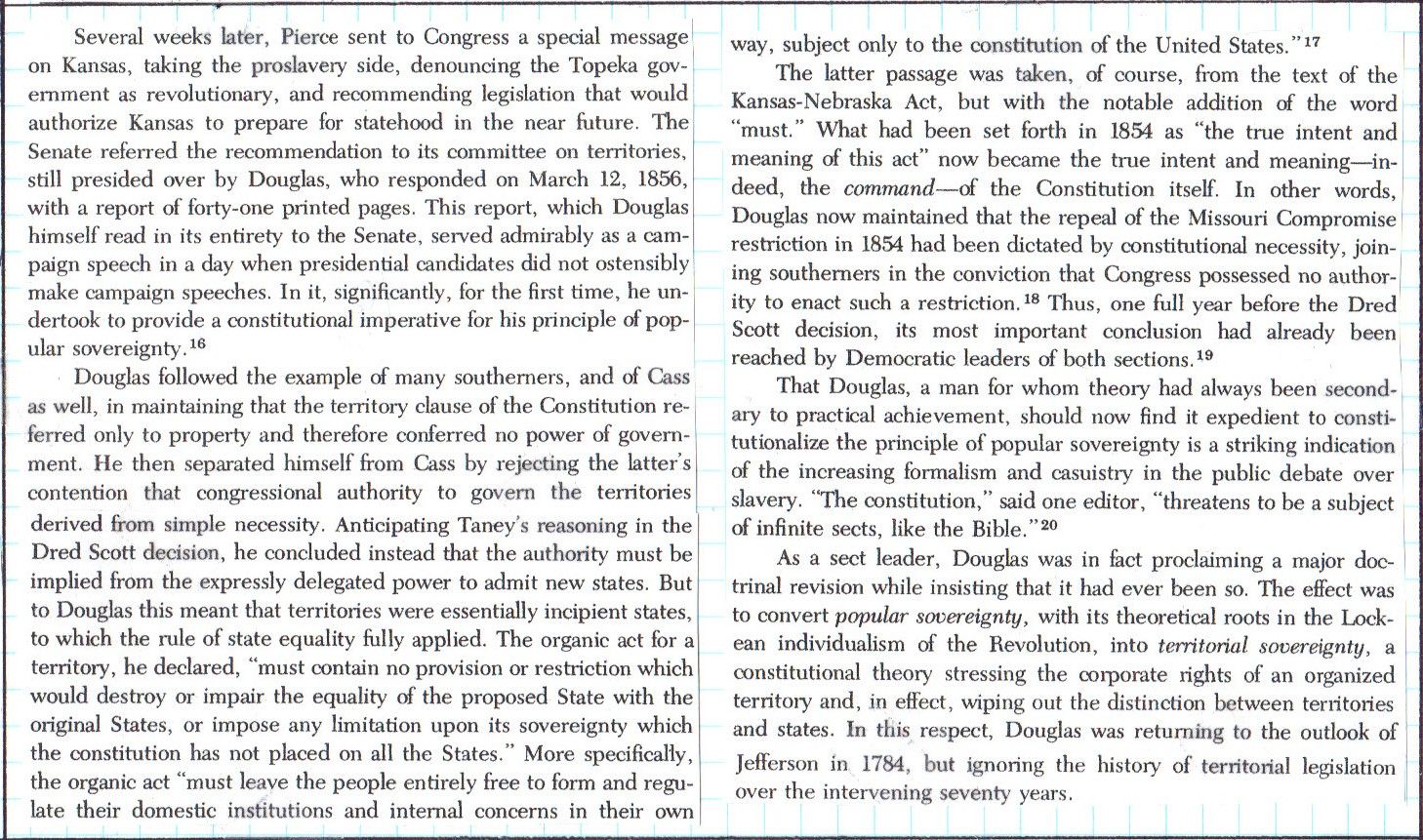
Don E. Fehrenbacher, "The Dred Scott Case: Its Significance in American Law and Politics" (1978)
The “censorship” of U. S. Mail began almost simultaneously with the abolition movement. The steam presses of New York went to work in the production abolitionist pamphlets and other propaganda, and were meant to be disseminated in the south (the abolitionists knew that live “agents” sent there would become dead agents). From the outset, the South began a program of censorship of abolitionist papers by using the U. S. Postmasters as their agents.
There was a debate in the mid to late 1830s between President Jackson and Senator Calhoun of South Carolina as to the best means of accomplishing the censorship. Jackson favored a federal law and policy to suppress the “unconstitutional and vile agitation to insurrrection.” Calhoun favored state laws making the importation of abolition publications “contraband” to be enforced by the postmasters. Neither side really liked the approach of the other. Calhoun realized that the Federal law was a violation of the 1st Amendment, and he didn’t like setting a precedent of a federal law interfering in what he saw as a state matter. But Calhoun had no problem with the states doing it, as prior to the 14th Amendment, the 1st Amendment only applied to Congress, not the states. Jackson didn’t like Calhoun’s approach is it was an extension of the doctrine of “State’s nullification,” and he had previously threatened the use of military force to compel South Carolina to follow U. S. Customs law in a prior nullification dispute.
The result was that no formal law was passed, but the postmasters, who at the time wielded considerable power and influence as the only agents of the Federal government in a local community, got the sense of their instructions and began searching mails and confiscating abolitionist materials. At first, this was as popular a measure in the north as in the south. However, the fact that private mails were being searched and seized by the federal government began to cause qualms in the north, was the initiation of bringing northern sympathy toward the abolitionists and away from southern slaveholders.
However, competing with the concept of "judicial review" were also the doctrines of "departmentalism," that each branch of government, in its own sphere, had the authority to determine the constitutionality of its acts. Also, as the author notes, the idea of "popular sovereignty" was still pervasive; the idea that the people themselves could determine, through the ballot box, whether an act was constitutional or not. Of course, for popular sovereignty to work, the people themselves have to know what's actually in the Constitution. Unfortunately, very few people today actually do, including a number here on this forum where you would expect a relatively high knowledge of the Constitution.
One of the many consequences of the Civil War, and the general evolution of American society, was that Courts were seen more and more as the repository of all Constitutional knowledge. From that came the concept of "judicial supremacy" in the late 1900s; the concept that Courts were the highest and final word on the meaning of the Constitution. Judicial supremacy was the necessary precursor to what we know today as "judicial activism," where the Court is not interpreting the laws made by the Congress or carried out by the Executive, they are making the law themselves. In so doing, they are necessarily creating and implementing policy decisions that underlie the laws they create, which is a role Courts were never, ever intended to play, of for which there are terribly ill-suited.
The judicial supremacist fallacy is a coup d’etat. All of that who support that destructive fallacy must be driven from the halls of power.
I don’t mind judicial supremacy if you can keep them from judicial activism. Antonin Scalia would have agreed.
“You seem . . . to consider the judges as the ultimate arbiters of all constitutional questions; a very dangerous doctrine indeed, and one which would place us under the despotism of an oligarchy...”
— Thomas Jefferson, Letter to William Jarvis, Sept. 28, 1820
“I do not forget the position assumed by some that constitutional questions are to be decided by the Supreme Court, nor do I deny that such decisions must be binding in any case upon the parties to a suit as to the object of that suit, while they are also entitled to very high respect and consideration in all parallel cases by all other departments of the Government...At the same time, the candid citizen must confess that if the policy of the Government upon vital questions affecting the whole people is to be irrevocably fixed by decisions of the Supreme Court, the instant they are made in ordinary litigation between parties in personal actions the people will have ceased to be their own rulers, having to that extent practically resigned their Government into the hands of that eminent tribunal.”
— Abraham Lincoln, First Inaugural Address
Was that the same Thomas Jefferson who executed the Louisiana Purchase knowing he was without the Constitutional authority to do so?
And the same Lincoln who ignored the Constitutional protections of Habeas Corpus?
Let’s say for the sake of the discussion that Jefferson and Lincoln’s actions were completely unconstitutional.
Two questions:
1) Would that change the truth of the two quotes I posted?
2) Would it justify a coup d’etat against our constitutional, republican form of government and the establishment instead of a judicial oligarchy?
And as illustration of this, think back to National Association of Manufacturers v. Sebelius and tell me you weren't hoping for an activist Court to strike down 0bamacare as unconstitutional. Today, take a look at the case of United States v. Texas, which is currently pending before the Supreme Court. Ask yourself: "What decision do I want to see from the Court?" As someone who posts here, the odds are pretty high you are hoping the Supreme Court will uphold the 5th Circuit decision enjoining the 0bama regime from pursuing the DAPA policy of blanket grant of legal status without Congressional authorization.
So if the Court rules in favor of Texas, and limits 0bama's power, are you going to rail against them as a "judicial oligarchy?" Or do you want them to rein themselves in, and allow 0bama to continue his Imperial Presidency unchecked?
My head hurts!
What I've come down to is I would actually trade a decision finding Texas has no standing if the Court would expressly overrule Massachussetts v. EPA, which is what Texas is relying upon to have standing in the case. Massachussetts v. EPA is one of the worst cases of judicial activism of all time, and one that gives a lot of credit to Eternal Vigilance's argument about judicial oligarchy.
But hopefully the left will find out that the decision in Massachussetts v. EPA can work both ways. And from reading the briefs and commentary on the case, the left is absolutely horrified that their monster is being turned against them.
Well, to more than sixty million dead babies, the fallacy of judicial supremacy is a pretty serious problem. It’s quite a threat to the next sixty million potential victims as well.
The continued destruction of marriage and the natural family, the most fundamental building block of our civilization, wrought via the coup d’etat that is being executed by the judicial supremacists, is pretty major as well.
Don’t get me wrong, all branches of government that are operating outside their legitimate authority must be reined in.
You know, I think I would make that same deal, but to include the part ruling that CO2 is a pollutant that can be regulated by the CAA. What utter stuff and nonsense.
But even so, it will take a Trump presidency to end the EPA reign of terror. Will he actually do it? I don't know. But I do know that the second president Clinton most assuredly would not.
A Republican presidency would need to do so much. Ending the EPA war on coal and carbon is certainly one. Repeal Dodd-Frank. Undo as much of Obamacare as is possible all these years later and reform the health care industry along free market lines. Fire the Democrat activists at IRS and throughout the bureaucracy. Mend fences with Israel and all our allies. I shouldn’t even attempt a list . . .
I really don’t see how a candidate with the negatives of Trump would ever beat even a candidate as horrible as Clinton. It will have to be Cruz or someone else picked through an open convention.
Disclaimer: Opinions posted on Free Republic are those of the individual posters and do not necessarily represent the opinion of Free Republic or its management. All materials posted herein are protected by copyright law and the exemption for fair use of copyrighted works.